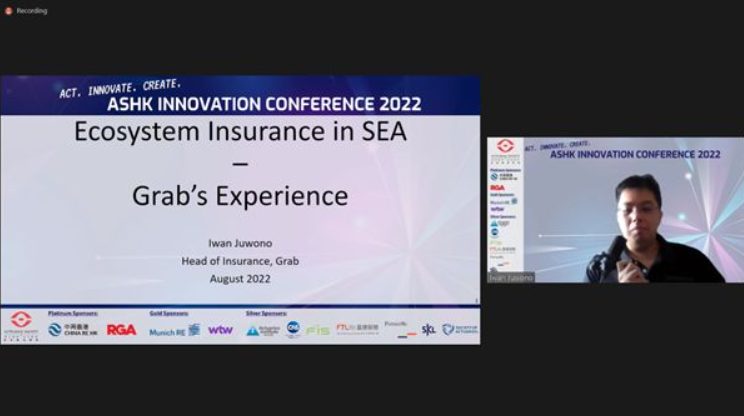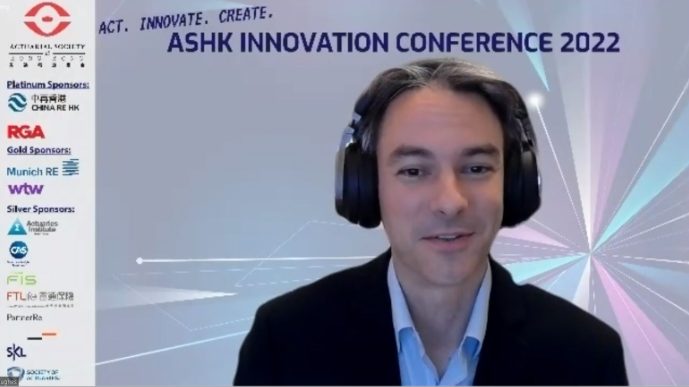
My takeaways from the ASHK Innovation Conference
From 30-31 August, I had the pleasure of attending several sessions at the ASHK Innovation Conference 2022, hosted by the Actuarial Society of Hong Kong. Here’s a summary of what I learned.
The Conference aims to keep actuaries from the Asia-Pacific region abreast with the latest technology and innovations, and discuss how actuaries can contribute to these new territories or apply new techniques in their current fields.
During the Conference, topics varied from digital insurance and digital asset insurance to innovations in the traditional insurance space were showcased by actuaries working from a range of start-ups and large insurance companies.
In the opening plenary session, the discussion focused on how the profession could change in the future with evolving new technology in artificial intelligence, data analytics, digitalisation, and decentralised finance.
In the session, automation was emphasised as a common trend in financial services.
However, apart from convenience and efficiency, there are also inherent risks with automation, such as bias, unfairness and discrimination, which could harm a company both financially and reputationally.
It was pointed out that actuaries possess both domain knowledge of how insurance companies operate and a deep understanding of risk management, so we were well positioned to help manage the risks of automation.
Another interesting point raised was that, by nature, actuaries can easily pick up the latest analytical techniques, such as the latest machine learning algorithms, but so do data scientists. Technical skills are not uniquely possessed by actuaries, but the way actuaries are trained to think and their ability to contextualise and solve a business problem make actuaries more attractive to employers.
It is challenging to attract young talent to work in insurance in Hong Kong. Many university students are reluctant to work in insurance. This is because working in insurance were often narrowly interpreted as a brokerage agent selling insurance policies in Asia. A potential solution raised to address this issue was to educate university students of the different divisions and their functionalities in the insurance value chain, as insurance is in fact quite complicated.
The next session I attended was a presentation by Iwan Juwono (Head of Insurance – Grab). Iwan shared Grab’s experience in ecosystem insurance in Southeast Asia. Grab, based in Singapore, provides users with transportation and food delivery services (like Uber and Uber Eats), as well as digital payment services (like Paypal or Alipay).

Digital insurance is often offered to its users (e.g. Grab drivers and riders) as embedded insurance. Iwan shared with the audience a variety of insurance products currently offered by Grab, which were created to be accessible, convenient, and transparent.
For example, Grab’s ride cover is offered to Grab riders with a primary benefit being a voucher payout if drivers are late or cancel trip before arrival. It is priced at 32 cents per ride, regardless of the distance and location of the trip. The product was designed with a clear target group, i.e. lower income and younger population, therefore, affordability and simplicity were important.
Iwan stressed that in addition to pricing and reserving, actuaries could also work in product design, customer journey, commercial negotiation, and business management.
This is because we not only analyse data and build sophisticated models, but also have domain knowledge and can apply long-term thinking to help solve business problems. However, he also warned that working in tech start-ups means working with VUCA (volatility, uncertainty, complexity, and ambiguity), which can make many actuaries uncomfortable and find it difficult to make decisions.
Another main theme at the conference was blockchain. Becky Tam (General Manager – OneDegree Digital Asset Insurance) shared OneDegree’s experience in digital asset insurance. Like specie insurance, digital asset insurance covers the theft and loss of digital assets, such as cryptocurrencies and NFTs. As digital asset companies face increasing pressure to demonstrate sound risk management and governance framework, there has been an increase in demand for digital asset insurance but also a shortage of supply due to reasons such as lack of claims data and multi-disciplinary knowledge, as well as traditional insurers’ unfamiliarity with digital assets.
Becky shared that to underwrite good risks that are within OneDegree’s risk appetite, they assess a company’s control environment, internal control design, hardware/software, financial strength, and obligation with customers.
A separate plenary session focused on the practical applications of blockchain for actuaries. It was highlighted that a potential application of blockchain in insurance is secure cross-company or cross-border data sharing. However, there are many challenges, e.g. high cost to establish and maintain the technology today, evolving regulation requirements, and privacy concerns. Therefore, there is very little incentive for any one insurer to adopt blockchain to share data with other insurers.
Innovation does not have to mean creating a completely new product or technology. In life insurance, Jonathan Hughes (Head of Strategic Development & Marketing – RGA EMEA) shared a few case studies on how actuaries could help improve business in non-traditional actuarial areas such as marketing and underwriting.

Raphael Li (Consultant – WTW) showcased machine learning techniques adopted in pricing and analytics. Xiaoxuan Li (Chief Actuary – China Re P&C) demonstrated how telematics were used to not only record how a driver drives, but also help a driver manage risk by, for example, sending a warning message to fatigue drivers to help reduce accidents.
Other sessions that I was unable to attend were:
- Practical applications of analytics in medical insurance by Chye Pang Hsiang (Principal and Consulting Actuary – Milliman).
- Ethical considerations of applying AI in Data Analytics by Jack Ng and Hilda Mansukhani (Swiss Re).
- Innovation exploration of intelligent operations in life insurance by Charles Cao (Executive Underwriter – China Re Life).
|
The Actuaries Institute was proud to be a Silver Sponsor of the ASHK Innovation Conference 2022.
|
CPD: Actuaries Institute Members can claim two CPD points for every hour of reading articles on Actuaries Digital.






